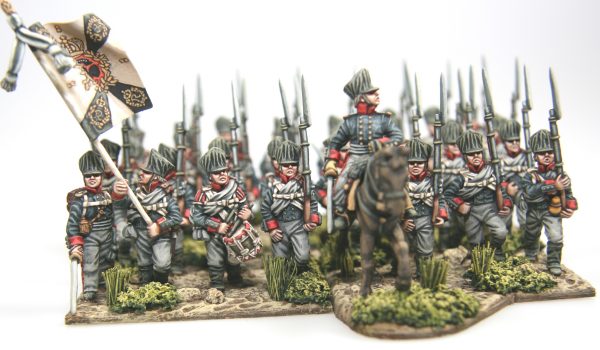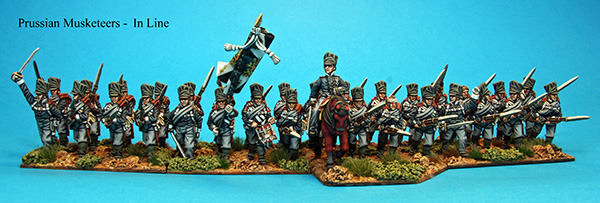
Please note that these figures are not suitable for use as line fusiliers.
I would like to thank Mr. Peter Bunde (Brigade plates) and Mr. Peter Hofschroer (the author of the Osprey books on the Prussian army of this period) for their advice and assistance, particularly as concerns the appropriate poses for the marching and trail-arms figures.
These figures have been designed to appear as Prussian line musketeers would have done on campaign. As such, all figures have:
Prussian infantry wore jackets (kollets) in Prussian blue. This was a very deep blue, almost black. Collars and cuffs were in provincial colours � Brandenburg, red: Pommerania, white: Silesia, yellow: East Prussia, brick red: West Prussia, carmine. Shoulder straps were in the seniority colour for the regiment � first regiment, white: second regiment, red: third regiment yellow: fourth regiment, light blue. Turnbacks were red for all regiments. A black neck stock was worn under the collar.
The breeches were grey worn tucked into the black gaiters or marching boots (for NCOs only).
All belting was white for musketeers. Note that the chest strap for the back pack was often worn under the greatcoat roll to facilitate the easy removal of the grey greatcoat. The leather sheath on the greatcoat roll was, in fact, the foul weather cover for the musket lock and was placed around the greatcoat for convenience (this information supplied by Alfred Uhmey via Peter Bunde). Reliable illustrations show infantry but not officers wearing the leather sheath on their greatcoats since officers did not carry muskets.
The pack and sabre scabbard were of red-brown leather as was the musket sling. The cartridge pouch was black with an oval brass metal plate on the cover. Sword knots were white with a toggle in company colour which is impossible to paint on a 25mm figure so don�t bother with it! The canteen strapped to the pack was covered with a canvas (off-white) cover the same colour as the haversack worn on the left hip. No water bottles are seen on Prussian line infantry until after the Napoleonic Wars, I can only conclude that this item was carried in the canvas haversack.
NCO distinctions were gold lace on collars and cuffs and the black leather marching boots.
Musketeer officers wore a coat of the same colour as the men with the same facing colour combinations but the tails of the coat were longer and the epaulets worn on the shoulders had silver lace piping according to rank. A new type of shoulder strap with distinctive gold crescents was introduced in 1814 but was not in widespread use in the infantry until after the Napoleonic wars. The officers also wore a silver sash at the waist. In the field officers wore grey overalls with a red stripe and a row of gold buttons down the outside seam. Musketeer officers carried a straight bladed sword in a red leather sheath. Not infrequently, the officers wore a grey frock coat (uberrock) instead of their kollet when on campaign. This had a collar in provincial colour with the usual rank epaulets at the shoulder and sash at the waist but no other facing or rank distinctions. Officers on foot always wore a backpack the so called 'badge of dishonour' introduced after the 1807 reorganisation of the army.
Mounted officers wore the same uniforms as described above. Shabraques were usually black 'bearskin'. Knotel has a number of illustrations of a dressier shabraque in red with a gold border and matching holster covers of a very distinctive type with the pistol handles poking visibly over the top of the cover. I will use this shabraque to mark higher ranking mounted officers. Saddles were often in brown leather but all other horse furniture was in black leather.
Flags were carried by senior NCOs. Several reliable illustrations show these men wearing what appears to be a double greatcoat roll. It took me some time to work out that one is indeed the greatcoat roll while the other is the rolled up cover for the flag. This was usually of black oilskin.
Musicians had �swallows nests� at the shoulders in facing colour with white piping. Those regiments with white facings had red swallows nests. The protective apron on the left knee was of the same calf-skin material (and colour) as the packs.
Unless you want to spend a lot of time and money pursuing original sources such as the Knotel and Brauer plates, the best modern source is undoubtedly Peter Bunde�s Brigade plates. Another good source of information is the third book in the series � 'Les Planches De La Belle Alliance'. This book reproduces the cards from the famous (and now difficult to find) Sturm cigarette album for the 1813 -15 'War of Liberation'. A last source worth mentioning for those of you with deeper pockets is the new re-print by LCV of Clement's 'Napoleon en Allemagne'. Although the text has been faithfully reprinted, LCV asked Alfred Uhmey to provide the documentation (illustrations) for a book originally bare of these. Alfred Uhmey is renowned for his collection of Napoleonic items and illustrations and has gathered in one (expensive) book many illustrations relevant to the armies engaged in Germany in 1813. His illustrations of the Prussian army are some of the best I have seen in any single book including Knotel plates and paintings, Brauer plates and some of the cigarette cards mentioned previously.

Click on the picture to see a larger version (1,177Kb) in a new window.
| Code | Description |
|---|---|
| PM1 | Right leg straight, left leg bent at the knee. Facing forward |
| PM1b | As PM1, facing right |
| PM2 | Left leg straight, right leg back. Head turned to the right |
| PM3 | Left leg forward, right leg back. Head facing forward. |
| PM4 | Left leg bent high at the knee, right leg straight. Head facing forward |
| PM4b | As PM4 facing left |
| PM5 | Left leg stretched forward, right leg trailing back. Facing forward. Holds musket with both hands |
| PM6 | Marching standard bearer |
| PM7 | Marching standard bearer |
Musketeer officers were armed with a straight bladed 'Degen'. All foot officers were required to wear a back pack, the so-called, 'badge of dishonour'. Most officers also wore the greatcoat roll like the men, as it afforded them some protection against sword and bayonet thrusts.
| Code | Description |
|---|---|
| PM8 | Marching officer holding sword at 45 degree angle to the ground |
| PM8b | As PM8 but wearing forage cap. Greatcoat roll added |
| PM9 | Marching officer, sword resting on shoulder left hand held high, greatcoat roll |
| PM10 | Advancing/charging officer. Sword held high |
| PM10b | As PM10 but wearing forage cap and greatcoat roll |
| PM11 | Advancing/charging officer, sword held high, greatcoat roll |
| Code | Description |
|---|---|
| PM12 | Left leg forward, right leg back, head turned to the left |
| PM13 | Left leg bent at the knee, right leg straight, head facing forward |
| PM14 | Left leg extended forward and bent at the knee, right leg straight back, head turned to the left |
| PM14b | As PM14 but with head turned to the right |
| PM15 | Enthusiastic musketeer, right arm holding musket in the air |
| Code | Description |
|---|---|
| PM16 | Right leg forward, left leg back |
| PM17 | Right leg forward, left leg lifted back |
| PM18 | Left leg forward, right leg lifted back |
| PM19 | Left leg forward and bent at the knee, right leg back |
| PM20 | Right leg forward and bent at the knee, left leg straight |
| PM21 | Standard bearer |
| PM22 | Drummer, holding drum |
| Code | Description |
|---|---|
| PM23 | Standing firing |
| PM24 | Standing ready, head turned to the left |
| PM24b | As PM24 but with head turned to the right |
| PM25 | Loading, biting cartridge |
| PM26 | Loading, ramming musket |
| Code | Description |
|---|---|
| PM27 | Sword arm down, head turned to the left |
| PM28 | Sword arm held out horizontally, head turned to the right |
| PM29 | Officer wearing the lagermutz (forage cap) and uberrock (short greatcoat favoured by officers on campaign) |
| Code | Description |
|---|---|
| PM30 | Marching officer, sword held down. Wears the shako, faces left |
| PM30b | As PM30, wearing forage cap. Head turned right |
| PM31 | Marching officer, sword shouldered, motioning with arm. Wears the shako |
| PM31b | As PM31 wearing the forage cap |
| PM32 | Charging officer. Pointing with sword, waving other arm. Wears shako and faces right |
| PM32b | As PM32. Wears cap and faces left |
| Code | Description |
|---|---|
| PM marching bareheaded pack | Versions of PM3 (bareheaded) and PM4 (bandaged head) |
| PM marching forage cap pack | Versions of PM1 and PM2 both wearing the forage cap introduced in 1813 |
| PM advancing/charging bareheaded pack | Versions of PM12 (bandaged head) and PM17 (bareheaded) |
| PM advancing/charging forage cap pack | Versions of PM13 and PM18 wearing the forage cap |
| PM firing line forage cap and bareheaded pack | Versions of PM23 (forage cap) and PM26 (bareheaded) |
| PM falling casualties | One falling forward the other back |
| PM prone casualties | One lying on his stomach, the other on his side |

Click on the picture to see a larger version in a new window.
The following figure packs are compatible with the above but can also be used with the trail-arms and charging sets soon to be released.
| Code | Description | Photos (click to enlarge) | Price |
|---|---|---|---|
| P14 | Six figures in trail arms poses. |
 
|
�6.60 |
| P15 | Same as P14 but with head variants. |
 
|
�6.60 |
| P16 | Command pack for trail arms figures. |
 
|
�3.30 |
Home | How to Order | Gallery | Links | E-mail List | About Us | Downloadable Catalogues | Sitemap